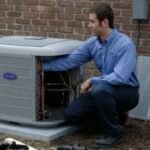A garage door opener is more than just a convenience—it’s a key component that impacts security, safety, and daily functionality for your home. With the variety of options available today, choosing the right one can feel overwhelming without clear guidance. Factors like noise level, lifting capacity, safety features, and smart technology compatibility all play a role in determining which opener fits your lifestyle. Your choice also needs to take into account the type of garage door you have, the level of maintenance you prefer, and your household’s specific needs. We will explore the essential aspects of selecting a garage door opener that ensures reliability, performance, and long-term satisfaction. By understanding your options in detail, you can invest in a system that offers smooth operation and peace of mind for years to come.
Key Considerations for Selecting a Garage Door Opener
Understanding Different Drive Types
The drive type is one of the first and most important factors to consider when selecting a garage door opener. Chain-drive openers are known for their durability and cost-effectiveness, making them suitable for heavy garage doors, but they tend to be noisier, which can be disruptive if living spaces are near the garage. Belt-drive openers use a rubber belt instead of a chain, providing quieter operation without sacrificing power—an ideal choice for homes with attached garages.
Screw-drive openers, which move the door with a threaded steel rod, require less maintenance but may be more sensitive to extreme temperatures. Lastly, direct-drive models have minimal moving parts, offering quiet performance and longevity. Whether you are upgrading your opener or scheduling a garage door spring repair, understanding these types and their advantages can help you match the opener to your household’s noise tolerance, budget, and usage requirements.
Considering Motor Power and Lifting Capacity
Garage door openers come in different motor strengths, typically measured in horsepower (HP) or horsepower equivalent (HPe). A standard single-car garage door often works well with a ½ HP motor, while heavier, insulated, or wooden double-car garage doors may require ¾ HP or even 1¼ HP. Selecting the right power level ensures that the motor can lift the door smoothly without straining, which prolongs the opener’s life. Overpowering the motor unnecessarily can increase costs without adding value, while underpowering can cause premature wear. Considering the door’s size, weight, and construction materials will help determine the ideal motor strength. Additionally, some modern openers offer energy-efficient motors with soft-start and soft-stop functions that reduce wear and provide a smoother motion, making them worth evaluating for long-term use.
Noise Levels and Living Arrangements
Noise is often overlooked until the opener is installed and daily use reveals how disruptive it can be. For garages directly below or adjacent to bedrooms, home offices, or living rooms, opting for a quieter belt-drive or direct-drive model can make a significant difference in comfort. Chain-drive models, while sturdy and reliable, can create vibrations that carry into the home, which is less ideal for quiet environments. Screw-drive openers fall somewhere in the middle, offering a reasonable balance between noise and strength. Additionally, some openers come with vibration-isolation systems and insulated housing to reduce operational sound. Taking noise levels into account before purchasing can ensure your household enjoys smooth operation without unnecessary disturbances.
Safety and Security Features
Modern garage door openers include safety features that protect both people and property. Photo-eye sensors are standard and stop the door from closing if an object or person is detected in its path, preventing accidents. Rolling code technology enhances security by changing the access code with each use, reducing the risk of hacking. Some models also feature automatic locking mechanisms that engage when the door closes, providing an extra layer of protection. Battery backup systems are another valuable addition, allowing you to operate the garage door during power outages. Choosing an opener with comprehensive safety and security features helps safeguard your home while ensuring that the garage door remains functional in various conditions.
Smart Technology and Convenience
Smart garage door openers are becoming increasingly popular, offering convenience and control through smartphone apps, voice assistants, and remote monitoring. With these features, you can check whether your garage door is open or closed, operate it remotely, and even receive alerts about activity—all from anywhere. This is particularly useful for households with multiple family members or for granting temporary access to visitors or service providers. Some smart openers integrate with home automation systems, allowing seamless operation alongside lighting, security cameras, and other devices. While these features are not essential for basic functionality, they can greatly enhance your daily routine and provide added peace of mind.
Maintenance and Longevity
The long-term performance of a garage door opener depends not only on its initial quality but also on the maintenance it requires. Chain drives may need periodic lubrication, while belt drives typically require less upkeep. Screw-drive models also need occasional lubrication to maintain smooth movement. Direct-drive openers, with fewer moving parts, often demand the least maintenance. Regular inspections, proper tension adjustments, and timely replacement of worn parts will extend the life of the opener regardless of its type. Choosing a model that aligns with your willingness and ability to perform upkeep can save you from unexpected downtime and costly repairs.
Selecting the right garage door opener involves much more than picking a motor and pressing a remote. It requires understanding the relationship between drive type, motor strength, noise level, safety features, and modern conveniences. From heavy-duty models for oversized doors to quiet belt drives for attached garages, there is an opener for every need. By weighing your options carefully and considering both short-term and long-term benefits, you can enjoy smooth, secure, and dependable garage door operation for years to come. A well-chosen opener not only makes daily life easier but also adds value and safety to your home.














